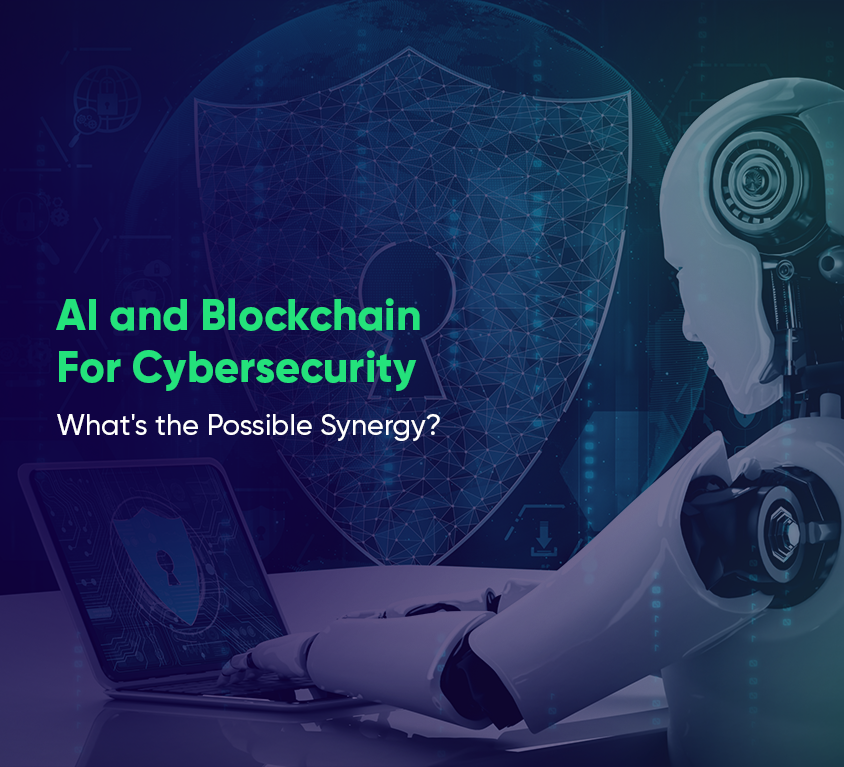
Introduction
Blockchain & Web3 Services Trusted By Leaders
- Develop innovative solutions using our state-of-the-art blockchain expertise.
- Achieve accelerated growth with robust & scalable Web3 consulting.
- Unlock 360-degree security with our top-rated blockchain development.
AI and Blockchain for Cyber Security: What’s the Possible Synergy?
AI mimics human intelligence, improving enterprise management. Blockchain can enhance transparency, decentralization, and security for businesses. However, a fusion of both can replace legacy systems, streamline management, and combat cyber threats. They both have revolutionized many industries like healthcare, education, and finance. Blockchain and AI duo also enhance cybersecurity and enable organizations to stay ahead of sophisticated threats. In this blog, we will go through the concept of AI and blockchain for cybersecurity, its possibilities, benefits, and examples;What is AI Cybersecurity?
Cyber security is the practice of protecting information systems, networks, and programs from unauthorized access, use, disclosure, disruption, modification, or destruction. It involves a combination of technologies, processes, and practices. Key terms include application security, information security, network security, operational security, encryption, access control, end-user education, and disaster recovery.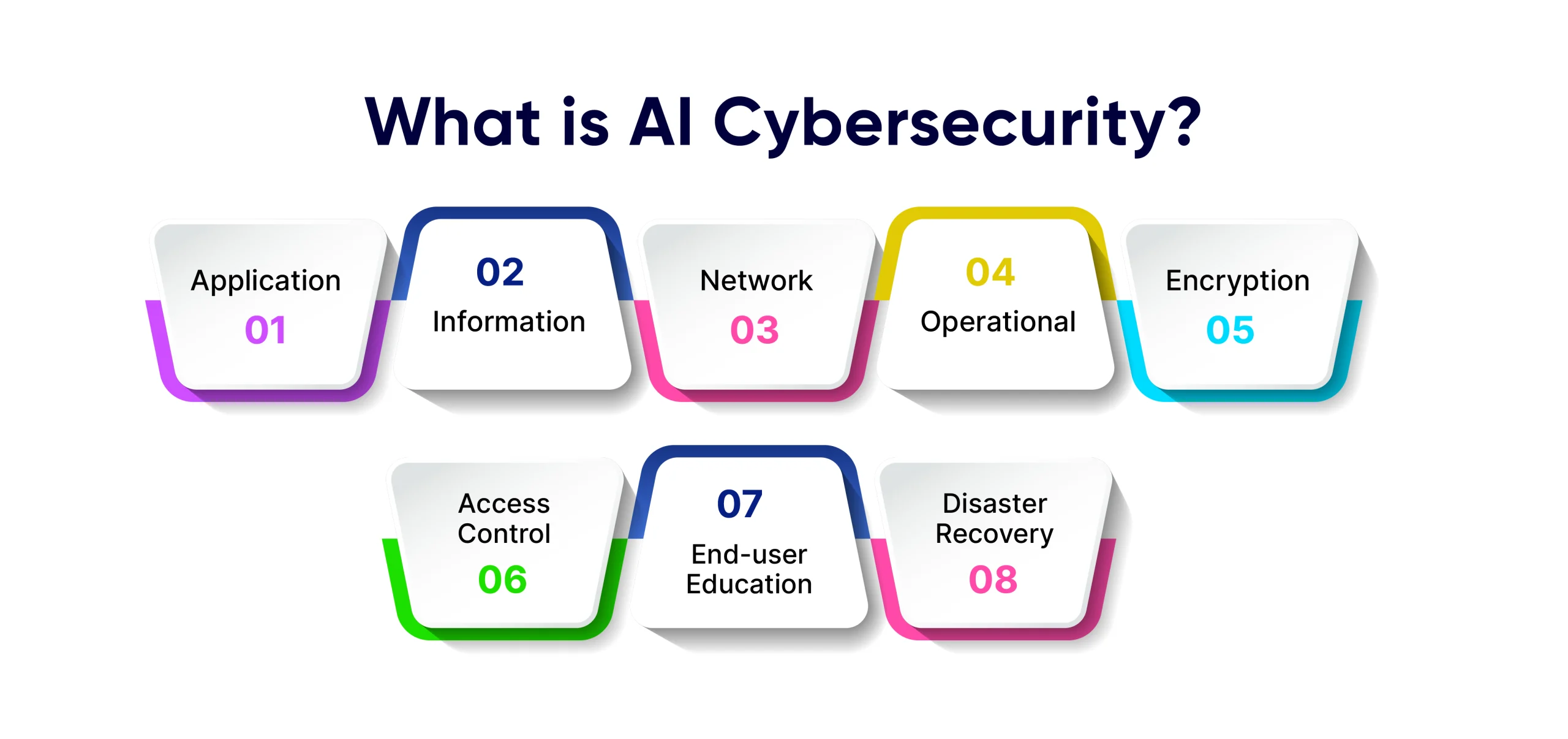
- Application security involves keeping software and devices free of threats.
- Information security focuses on protecting confidentiality, integrity, and availability of information.
- Network security protects the usability and integrity of a computer network and data.
- Operational security aims to protect information systems through people, processes, and technology.
- Encryption scribbles data to make it unreadable without a decryption key.
- Access control limits access to systems and data to authorized users.
- End-user education teaches users about cybersecurity best practices.
Evolution of Programming Languages and Cybersecurity
There are a lot of programming languages. Each has its advantages and purpose of use. New programming languages like RUST, Solidity, and GO have emerged to address cybersecurity concerns in online activities.- RUST prioritizes memory safety and performance, providing a secure foundation for software development.
- Solidity is designed for Ethereum blockchain smart contracts and ensures secure and decentralized applications.
- GO is known for simplicity and efficiency and is popular for building scalable and secure systems.
Role of Blockchain and AI in Cybersecurity
Blockchain and AI are relatively new but emerging technologies with significant potential in cybersecurity defenses. → Blockchain, distributes data across a network of computers, eliminating single points of failure for hackers. Its immutability and transparency promote accountability and trust. AI, on the other hand, can analyze vast amounts of data to identify patterns and anomalies, automate security responses, and learn from past cyberattacks to predict future threats. Combined, it can enhance threat analysis, enable self-learning security systems, and provide a secure platform for deploying AI-powered security solutions. However, it is important to create a more robust and comprehensive cybersecurity ecosystem. With this, there are some drawbacks like integration challenges that include seamless integration, scalability, data encryption, and privacy. MarketandMarket predicts a 23.3% growth in AI in the cyber security market, from $8.8 billion in 2019 to $38.2 billion by 2026. However, decentralized intelligence combines AI and blockchain technologies to provide advanced decentralization, smart contracts, accurate tracking that eliminates fraud and errors, decision-making capabilities, and secure data transmission. As a result, this synergy enhances security, trust, and data privacy. There are top adopters like Cuardtime, Gatecoin, Ripple, and Blockcypher.Benefits of Blockchain and AI in Cybersecurity
The rise in IoT adoption is a major driver, as the number of connected devices increases the attack surface, leading to increased cyber threats and phishing attacks. The complexity and volume of cyberattacks demand advanced security solutions, which AI-based systems can help address. Here are some of the benefits that AI and Blockchain offer in cybersecurity;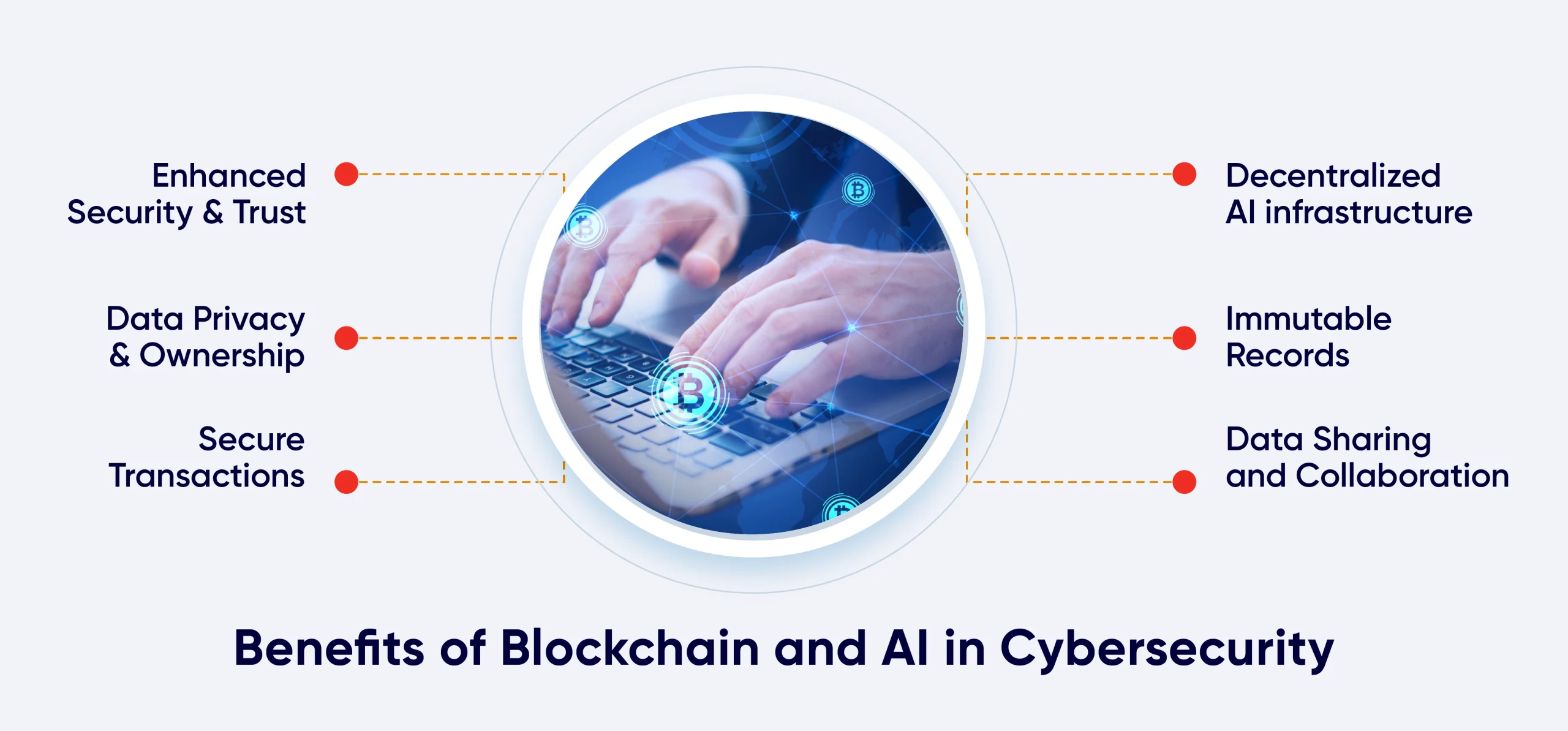
-
Enhanced Security & Trust
Implementation of Blockchain or integration in any organization enhances security and trust in AI systems by providing a robust framework for decentralization and cryptographic algorithms. Organizations will get virtually tamper-proof storage of AI models, datasets, and transactions, ensuring data integrity and preventing unauthorized access, particularly crucial for critical data-driven decision-making in sectors like healthcare or finance.
-
Decentralized AI infrastructure
Blockchain-based decentralized AI infrastructure provides efficient and scalable processing of data without the need for a centralized system. This is a holistic approach that can allow data to be processed on multiple computing devices. It results in a diverse range of outcomes that can be used to create unique solutions to issues that a centralized system might not be able to address.
-
Data Privacy & Ownership
While AI is full of benefits and works as a powerful tool for organizations, it raises concerns about data privacy and ownership. Blockchain provides a decentralized framework for managing data access permissions, ensuring individuals have control over their data. It also enables AI developers to securely access and use data through smart contracts and encryption techniques, respecting privacy preferences.
-
Immutable Records
Centralized systems are vulnerable to hacks and alter. Blockchain can record AI model parameters and updates, ensuring the integrity of the AI’s decision-making process. This adds transparency and trust to AI-powered security systems.
-
Secure Transactions
Transaction data is important to any organization. A centralized system was not tampered proof but with blockchain, you can have secure transactions and communications between AI systems, preventing interception or manipulation by malicious actors.
-
Data Sharing and Collaboration
Data sharing was a complex and time-consuming task. However, with blockchain secure data sharing among organizations is easier with the analysis of AI. AI checks the shared data for threat detection, enabling collaborative threat intelligence interchange.
Possibilities of Blockchain and AI in Cybersecurity
While blockchain and AI offer individual advantages in cybersecurity, their true power lies in the super duo. Here are some exciting possibilities for their duo;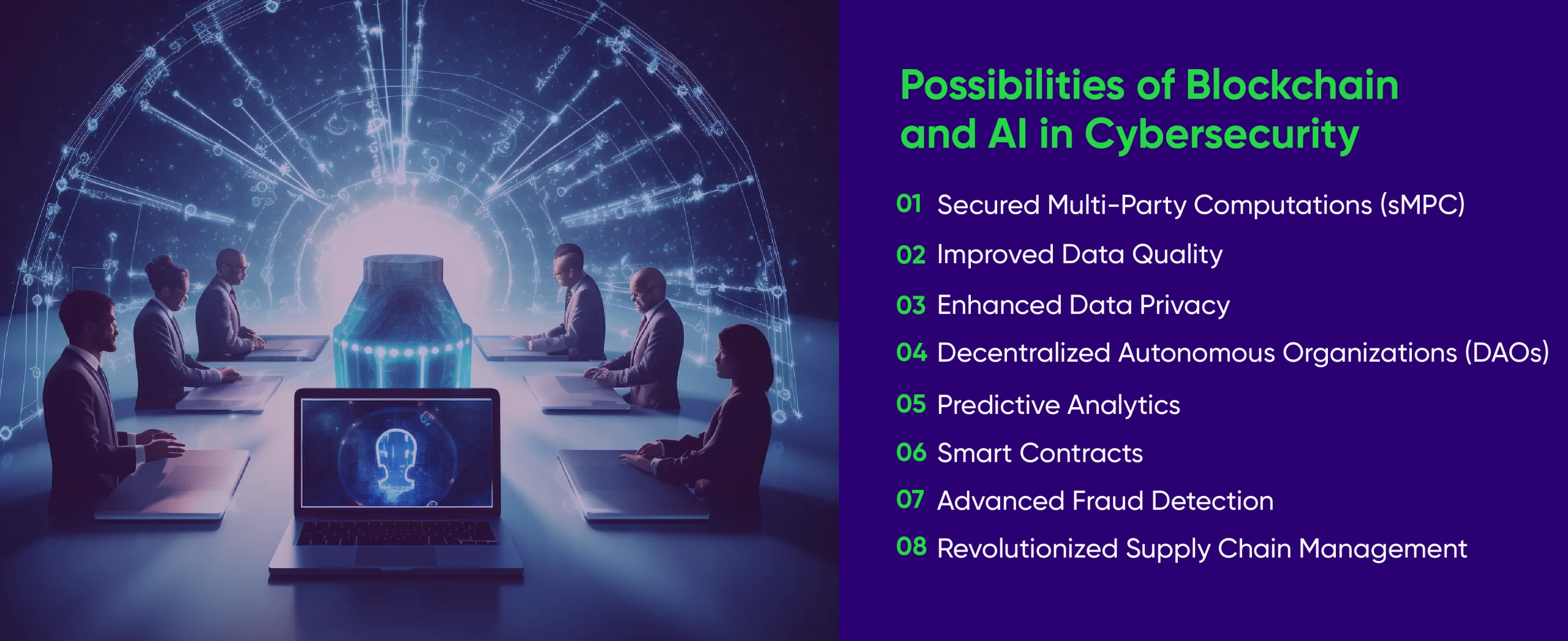
-
Secured Multi-Party Computations (sMPC)
sMPC is a cryptographic technique that allows multiple parties to analyze data collectively without revealing their private information. With the use of AI and blockchain, sMPC can securely distribute and train AI models across multiple parties on a blockchain. Ultimately, this collaboration enables AI projects without compromising data privacy.
-
Improved Data Quality
AI depends heavily on clean and authentic data for accurate results. Blockchain being a tamper-proof ledger ensures data accuracy and timeliness, especially in sectors like healthcare and finance where data quality significantly impacts decision-making.
-
Enhanced Data Privacy
The rise of big data raises concerns about data collection, storage, and usage. While AI can analyze this data for insights, privacy issues persist. Blockchain can create a secure and transparent record of data usage, potentially addressing these concerns and building trust in data collection and analysis.
-
Decentralized Autonomous Organizations (DAOs)
Combining AI for decision-making and blockchain for transparency and security can pave the way for DAOs. DAOs are organizations that are run entirely by software. The synergy could lead to more efficient and accountable decision-making within organizations.
-
Predictive Analytics
AI can leverage the vast amount of data stored on a blockchain to perform predictive analytics. For instance, AI could analyze cryptocurrency transaction history to predict price movements or analyze supply chain data to predict future product demand.
-
Smart Contracts
AI can empower smart contracts to adapt to changing conditions or execute actions based on blockchain data. Imagine an AI-powered smart contract for insurance that adjusts policy terms based on real-time data about the insured asset.
-
Advanced Fraud Detection
Blockchain’s immutability and transparency make it ideal for fraud detection. AI can analyze blockchain data in real-time to identify suspicious activity, such as unusual transaction patterns or large fund transfers, enabling proactive measures against fraud and cyberattacks.
-
Revolutionized Supply Chain Management
AI can enhance supply chain management on the blockchain by enabling real-time tracking of goods and services. AI-powered sensors can collect data about the location, condition, and quality of goods throughout the supply chain, with this data securely stored on the blockchain. This improves supply chain transparency and reduces the risk of fraud or counterfeiting.
Examples of Blockchain and AI-Powered Cybersecurity Systems
Cybersecurity technologies are experiencing a major shift as new projects and systems come out regularly. Notable instances of cybersecurity systems powered by blockchain and AI include: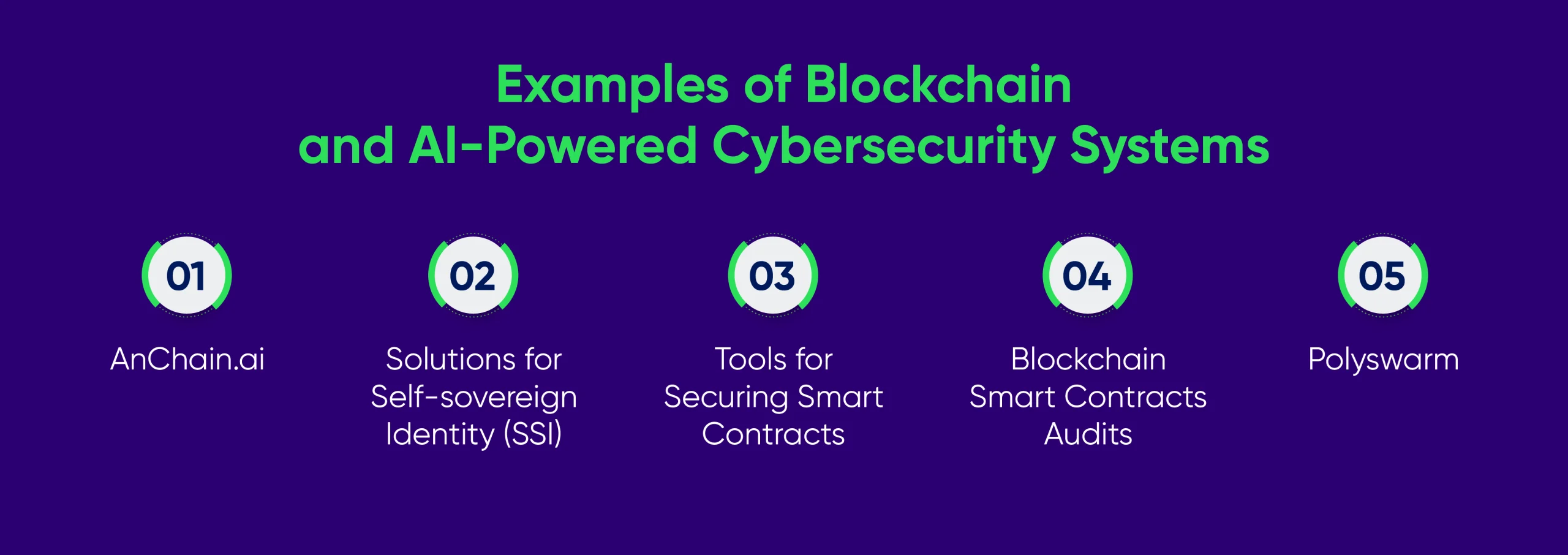
-
AnChain.ai
The AI-powered blockchain security platform uses AI and machine learning algorithms to identify and stop threats and attacks centered around blockchain technology. They offer a variety of blockchain networks real-time monitoring and anomaly detection services.
-
Solutions for Self-sovereign Identity (SSI)
A few SSIs have looked into using AI for identity authentication and verification, using blockchain technology for secure identity management. Biometric data and other factors can be analyzed by AI algorithms to verify the authenticity of identity.
-
Tools for Securing Smart Contracts
Some platforms and tools, including MythX and Truffle, use AI and machine learning to scan smart contracts for security flaws. The purpose of these tools is to facilitate developers’ ability to recognize and address possible security risks.
-
Blockchain Smart Contracts Audits
Blockchain development and security provider, Bloxbytes combines formal verification techniques with AI-powered scanning to smart contracts audit and blockchain ecosystems for vulnerabilities. Their team helps clients by using AI to identify potential threats and weaknesses in blockchain code.
-
Polyswarm
A decentralized threat intelligence marketplace that pays security professionals for spotting and thwarting threats. Participants submit potential threats, which are analyzed by AI algorithms. The accuracy of the threat assessments determines rewards.